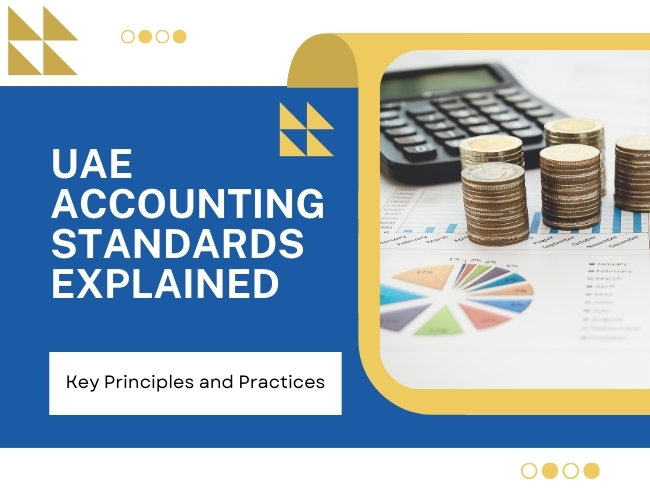Understanding UAE Accounting Standards: Why They Matter to You
The UAE accounting standards are the rules and practices that guide how businesses in the United Arab Emirates record, present, and report their financial information. These standards ensure financial transparency, consistency, and local and international regulations compliance. If you’re running a business in the UAE, understanding these accounting standards is not optional. It’s essential.
In this article, you’ll gain a complete overview of UAE accounting standards, key principles that guide financial reporting, how they align with IFRS, and what practices you need to implement. We’ll also cover compliance challenges and offer tips to help you stay ahead.
What Are Accounting Standards?
Accounting Standards in UAE: A Global-Local Blend
UAE accounting standards follow the International Financial Reporting Standards (IFRS). All entities listed in the UAE financial markets must comply with IFRS, which is issued by the International Accounting Standards Board (IASB).
Privately held companies follow IFRS, especially when external stakeholders such as banks or investors are involved.
Why IFRS Is Adopted in the UAE
- Enhances credibility in global markets
- Attracts foreign investors
- Simplifies financial comparison across jurisdictions
Governing Authorities and Their Role
- Ministry of Economy: Regulatory oversight and compliance.
- UAE Federal Tax Authority (FTA): Tax alignment with financial reporting.
- Securities and Commodities Authority (SCA): Regulates listed companies.
Key Accounting Principles You Must Know
Accrual Basis of Accounting
You must recognize revenues and expenses when earned or incurred, not when cash changes hands.
Consistency Principle
Apply the same accounting policies from one period to another unless there’s a justified reason to change.
Prudence (Conservatism)
Don’t overestimate revenues or underestimate liabilities. Always present a cautious view.
Going Concern Assumption
Your business is assumed to continue operations into the foreseeable future unless there’s strong evidence otherwise.
Materiality
Only information that would influence a decision-maker needs to be reported.
Core Financial Reporting Requirements in the UAE
UAE Accounting Standards: Mandatory Disclosures
- Statement of Financial Position
- Statement of Comprehensive Income
- Statement of Cash Flows
- Statement of Changes in Equity
- Notes to Financial Statements
Specific Rules for Different Business Structures
Sole Proprietorships & Partnerships
While smaller in scope, your financial records must still meet audit and tax filing requirements.
Limited Liability Companies (LLCs)
You must maintain proper books of accounts for at least five years. IFRS compliance is expected.
Free Zone Entities
You must comply with respective free zone authority regulations, often requiring audited financials and IFRS compliance.
Public Joint Stock Companies (PJSCs)
SCA strictly regulates you and must file IFRS-compliant reports quarterly and annually.
Transitioning from Local to IFRS-Based Standards
How to Align Your Records
- Review existing accounting policies
- Train your accounting staff
- Upgrade accounting software
- Engage external auditors for a smooth transition
Challenges You Might Face
- Staff resistance or lack of IFRS knowledge
- System incompatibility
- Interpretation differences in applying IFRS
VAT and Its Link to Accounting Standards in UAE
Accounting for VAT in the UAE
Since VAT introduction in 2018, you’re required to:
- Keep digital VAT records
- File VAT returns quarterly or monthly
- Reconcile VAT accounts with financial statements
Impact on Financial Statements
- VAT affects revenue recognition and liability recording
- You must report VAT as a separate line item
Corporate Tax and Financial Reporting Obligations
Tax-Compliant Accounting
The upcoming corporate tax law emphasizes accurate financial reporting. You must:
- Maintain audited financial statements
- Use accrual basis accounting
- Separate capital and operational expenses
Common Accounting Mistakes You Should Avoid
Top Errors Businesses Make
- Using cash basis instead of accrual
- Incomplete bookkeeping
- Failing to reconcile accounts monthly
- Poor documentation for tax audits
Best Practices to Prevent Mistakes
- Use professional accounting software
- Hire or consult certified accountants
- Conduct periodic audits and reviews
UAE-Specific Reporting Considerations
Industry-Specific Guidelines
Some industries like real estate, construction, and financial services have additional disclosure and recognition requirements.
Free Zone vs Mainland Reporting
Although both follow IFRS, the extent and frequency of reporting vary by jurisdiction. Free zones may require annual audit submissions.
Technology in Accounting: Your Competitive Edge
Digital Tools to Simplify Compliance
- Cloud-based accounting platforms
- Integrated tax compliance systems
- Automated reconciliation tools
Benefits You’ll Gain
- Reduced errors
- Faster reporting cycles
- Real-time financial visibility
How to Stay Compliant Year-Round
Your Financial Calendar Checklist
- Monthly: Reconcile bank accounts, update ledgers
- Quarterly: File VAT returns, review financials
- Annually: Audit, file corporate taxes, renew licenses
Regulatory Reporting Deadlines
- VAT: Filed quarterly/monthly depending on FTA assignment
- Corporate Tax: Filing to begin from 2025 based on financial year
- Annual Audit: Required for most free zone and mainland entities
Work with Al Zora Accounting & Advisory
Why Us?
Decades of experience in UAE compliance
IFRS and tax law specialists
Personalized financial strategy and support
Our Expertise Includes:
IFRS implementation
Corporate tax planning
VAT reporting
External audits
Accounting software consultation
Final Thoughts: Your Next Steps
The UAE’s accounting standards aren’t just about compliance; they’re the foundation of your business’s finances. The Al Zora Accounting & Advisory team provides tailored solutions to ensure that you are audit-ready, tax-compliant, and investor-friendly, whether you are a startup in a free zone or a large LLC on the mainland.
Stay updated, seek expert advice, and treat accounting as a legal obligation and strategic tool.
We can assist you with any accounting services in Dubai that you may need
Frequently Asked Questions (FAQs)
1. Are UAE accounting standards the same as IFRS?
Yes, the UAE primarily adopts International Financial Reporting Standards (IFRS) for financial reporting.
2. Who must follow UAE accounting standards?
All companies operating in the UAE, including LLCs, free zone entities, and listed companies, must follow UAE accounting standards.
3. Is IFRS mandatory for free zone companies?
Yes, most free zones require IFRS-compliant financial statements for license renewal and audits.
4. What is the difference between cash and accrual accounting?
Cash accounting records transactions when money changes hands, while accrual accounting records them when earned or incurred.
5. Do small businesses in the UAE need to follow IFRS?
Yes, especially if they are VAT registered or seeking investor funding. IFRS ensures transparency and credibility.
6. How often should I audit my financial statements in the UAE?
Annually. Most jurisdictions require businesses to submit audited statements each year.
7. Is VAT reporting part of UAE accounting standards?
Yes. VAT reporting must be integrated with your financial statements and filed regularly with the FTA.
8. What happens if I don’t comply with UAE accounting standards?
Non-compliance can lead to fines, penalties, business license cancellation, and tax audits.
9. Can I use international accounting software in the UAE?
Yes, but it must support IFRS and UAE VAT regulations for accurate reporting.
10. What is the role of the Ministry of Economy in accounting?
The Ministry of Economy oversees regulatory compliance and financial governance for businesses in the UAE.
11. Do free zones have different accounting rules?
Yes. Each free zone may have specific audit and reporting requirements, though all follow IFRS generally.
12. What is the new corporate tax law’s impact on accounting?
It mandates maintaining accurate, IFRS-based financial records and audited statements.
13. What accounting records must be kept?
You must retain ledgers, invoices, audit reports, VAT filings, and financial statements for at least five years.
14. When will UAE corporate tax take effect?
Corporate tax is applicable from June 1, 2023, based on your company’s financial year.
15. How do I choose the right accountant in the UAE?
Choose professionals familiar with UAE regulations, IFRS, VAT, and corporate tax. Look for certifications like ACCA or CPA.




